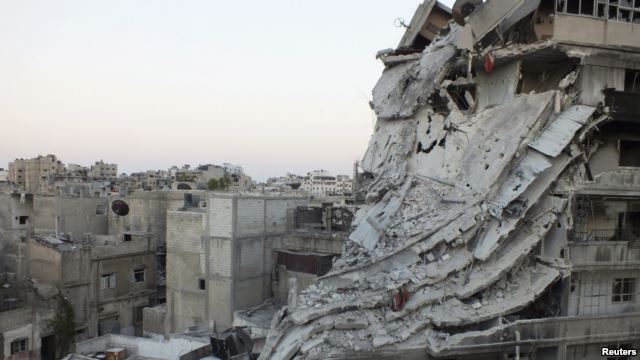LATEST: OPCW — Assad Regime “Constructive” in 1st Stage of Chemical Weapons Destruction
Jump To Latest Updates
SUMMARY: Prime Minister Wael al-Halqi has appealed to Syria’s investors and industrialists to return to the country, claiming it is now in a reconstruction stage despite the ongoing conflict.
Meeting the Syrian Exporters Association For Clothes and Textiles, al-Halqi asserted said the Government is seeking “to upgrade industry, in spite of the current circumstances, thanks to the national will and joint dialogue to make decisions that can face the crisis”.
The Government said last week that Syria had lost $3 billion in industry since the uprising against the Assad regime began in March 2011.
Despite millions of displaced people and critical situations in many areas over basic needs, the Prime Minister said “food and medical security is consolidated, thanks to the unity of the army and the people”.
(Featured Photo: Destruction in the Khalidiya section of Homs)
Latest Updates, Most Recent First
OPCW: Assad Regime “Constructive” in 1st Stage of Chemical Weapons Destruction
The head of the Organization for the Prohibition of Chemical Weapons, Ahmet Uzumcu, has praised the Assad regime as the international team begins oversight of the destruction of Syria’s chemical weapons.
Inspectors visited a first site earlier this week, where they saw some chemical weapons equipment destroyed, and are expected to visit more than 20 others over the coming days, Uzumcu said.
He asserted, “The cooperation has been quite constructive, and IAhmet Uzumcu will say that the Syrian authorities have been cooperative.”
Two More French Journalists Confirmed to Have Been Kidnapped
France’s Foreign Ministry said on Wednesday that Nicolas Henin of Le Point magazine and Pierre Torres of the French-German television channel Arte have been held hostage for 3 1/2 months in Syria.
The journalists were taken on June 22, but their disappearance had not previously been made public.
Two other French reporters, war correspondent Didier Francois and photographer Edouard Elias were abducted in early June on their way to Aleppo.
French Foreign Minister Laurent Fabius said on Sunday that Francois and Elias are alive.
Shipping Falls By 60%-80%
A Reuters overview of Syria’s decline in shipping trade includes this telling passage:
Ship-tracking data from maritime analytics firm Windward shows that the number of ships — dry bulk, container and general cargo vessels — calling at the ports of Tartous and Latakia has fallen since the start of the year.
Port calls made by dry bulk vessels have fallen from a peak of 108 in March to just 20 in September. Similarly, 120 general cargo vessels made port visits in March, falling to 52 in September, the data shows.
“Although sanctions have had an impact on Syrian trade, the dangers to inland transport may also curtail trade into Syrian ports,” a shipping industry source said.
“Ship tracking shows the major ports are receiving only four or five ships a day, nearly all of which are small local general cargo vessels.”
Many of the vessels visiting Syrian ports are among the oldest in the global fleet, averaging 28 years old, the data shows, which sources say reflects the caution bigger lines have about sending more modern ships in.
Assad Appeals to Arab People To Stand Against Their Governments
In an interview with the newspaper Tishreen, President Assad has appealed to pan-Arab identity and “resistance”, including against Israel, to counter opposition from States in the region:
If we were to make a quick and brief comparison between that period and this one, – forty years ago the Arab states were united: culturally, ideologically, morally, politically, militarily and media wise against the Zionist enemy. Today, the Arab states are united, but against Syria….
Today, the enemy fighting the Syrian and Egyptian armies is an Arab and Muslim enemy. Forty years ago, treason and collaboration with the enemy were hidden, while today they are openly declared and have become a choice for individuals, governments and for Arab officials: the choice of being a collaborator or not. They are no longer considered as taboos.
Casualties
The Local Coordination Committees claim 70 people were killed on Tuesday, including 19 in Damascus and its suburbs, 16 in Daraa Province, and 15 in Idlib Province.
The Violations Documentation Center records that 75,204 people have been killed since the start of the conflict in March 2011, an increase of 65 from Tuesday. Of the dead, 56,101 are civilians, a rise of 52 from yesterday.

